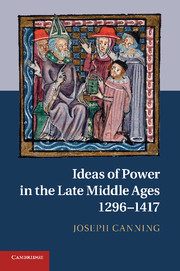Book contents
- Frontmatter
- Contents
- Preface
- Abbreviations
- Introduction
- Chapter 1 Ideas of power and authority during the disputes between Philip IV and Boniface VIII
- Chapter 2 Dante Alighieri: the approach of political philosophy
- Chapter 3 Marsilius of Padua
- Chapter 4 Power and powerlessness in the poverty debates
- Chapter 5 The treatment of power in juristic thought
- Chapter 6 The power crisis during the Great Schism (1378–1417)
- Conclusion
- Bibliography
- Index
Chapter 1 - Ideas of power and authority during the disputes between Philip IV and Boniface VIII
Published online by Cambridge University Press: 25 October 2011
- Frontmatter
- Contents
- Preface
- Abbreviations
- Introduction
- Chapter 1 Ideas of power and authority during the disputes between Philip IV and Boniface VIII
- Chapter 2 Dante Alighieri: the approach of political philosophy
- Chapter 3 Marsilius of Padua
- Chapter 4 Power and powerlessness in the poverty debates
- Chapter 5 The treatment of power in juristic thought
- Chapter 6 The power crisis during the Great Schism (1378–1417)
- Conclusion
- Bibliography
- Index
Summary
The disputes between King Philip IV of France and Pope Boniface VIII in the years 1296 to 1303 over who held legitimate power, that is, authority, provoked a debate which gave a new direction to political thought. This was a classic case of the development of political ideas in response to a crisis. It was a great paradox of medieval history that the church, originally instituted outside the governmental and legal structures of the Roman Empire, had itself over time become the prime developer of the language of power. Here was the crisis of this process, begun in the fifth century, revitalized in the papal reform of the eleventh and consolidated in the twelfth and thirteenth, whereby the church had developed as a legal and governmental institution under a papal monarchy with increasing jurisdictional pretensions. Papal claims to power were encapsulated in the concept of the pope's plenitude of power (plenitudo potestatis). The origin of this formulation lay with Pope Leo I (440–61), who used the phrase in a restricted manner to indicate how the delegated and therefore partial authority of a papal vicar, that is, legate, differed from the pope's, which was full in relation to it. The formulation was not used by Gregory VII, but emerged in the twelfth century as a way of expressing papal sovereignty, a usage which diverged from Leo I's original meaning, and was to be found frequently, and definitively, in Innocent III's decretals. The conflicting claims of the church and of secular rulers had now brought about a conflict with the French king, stimulating both defence and refutation of the papal position, together with profound discussion of the nature, exercise and location of authority in society. Indeed, this intellectual ferment produced a mass of pamphlets, tracts and treatises which amounted to a new genre devoted to ideas of power. There was a creative application of traditions of discourse to contribute to discussion of the issues involved in the crisis, with a variety of diverse results. Clear perceptions of questions of power and authority were elaborated.
- Type
- Chapter
- Information
- Ideas of Power in the Late Middle Ages, 1296–1417 , pp. 11 - 59Publisher: Cambridge University PressPrint publication year: 2011



